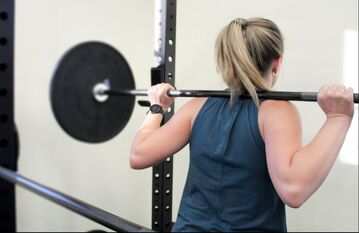|
3/11/2024 0 Comments Strength Training for RunnersBy Jess Kehoe, DPT Missoula is full of runners. We are blessed to have ample trail systems which, nearly anywhere you live, can be accessed nearby. We have big hills to run up and down and miles of pavement to pound if that’s your preference. We’ve got professionals and near professionals in our midst, and those of us just in it for the regular daily jog, with their dog or friends. No matter the category you fall into, runners are always looking for ways to stay on their feet, and avoid the common injuries. That brings us to the point of this blog, the benefits of a weight training program for runners.
There is evidence coming out of the Montana Running Lab here at the University of Montana, that there are several positive benefits to getting stronger. Some of these that can directly impact running are increased bone mass, stiffer tendons and more resilient joints. Another recent systematic review(1) looking at non-running based injury prevention programs has shown that the most effective requires more than 6 weeks of consistency, and are more effective with professional guidance. This makes some intuitive sense since it takes 6 weeks to begin making changes in your muscle tissues with a weight training program, so staying consistent for the long haul will give you the most benefit. Also it appears that having a professional guide might make it more likely that you are consistent and that you are working to your full potential. Maybe you are new to this idea, or maybe you have been lifting for years. Maybe you have been struggling with a chronic injury or just interested in trying to improve your strength. In any case, the PTs here at Alpine think that adding a strength training program to your routine is a worthwhile investment. Adding exercises like the back squat, single leg Romanian deadlift, planks, calf raises and plyometrics to name a few can challenge your muscles and tendons to increase strength and resiliency for running. To avoid feeling like your lifting training causes fatigue for running, we have a few suggestions. First, lifting twice per week is enough. If you have been consistent with lifting for several months, and your running is ramping up, there is even evidence(2) that maintaining only one weight training session per week can help retain strength benefits. Second, the number of exercises doesn’t have to be many, you can keep it to 4 or 5, and only 3-4 sets per session. If you feel this causes fatigue in your running, reduce a set but keep the weight heavy. Also, don’t work until complete exhaustion, allow 2-3 more reps in the tank for each set and take a 2-3 minute break between exercises to avoid circuit training. Thirdly, if you are trying to lift and run on the same day, run first. This way you can adjust your lifting if you are feeling fatigued, instead of tired legs from the lift affecting your run. For many weight lifting programs you will see reference to a 1RM which stands for one repetition max, or the weight you could lift for only one attempt. The guidance coming out of the Montana Running Lab is that the best range to work in is 70-80% of your 1RM. There are some apps out there that will calculate your 1RM such as this one. However, if you don’t work out at a gym, or don’t feel the need to be quite so scientific about it, you can also use the following general advice. Muscles will strengthen due to the overload principle, complete 3-4 sets of 6-8 reps at a weight that makes it feel that you cannot do many more. If you don’t have complete weight sets available to you then the next best option is to use a challenging weight, and complete as many reps for 2-3 sets that causes fatigue, or again gets you to where you cannot do many more with good form. For instance at home I only have a 20# dumbbell, so I might do 2 sets of 15 Bulgarian split squats with this weight, but if I’m in the gym I’ll go heavier and complete the 3-4 sets of only 6-8 reps. Always remember that you shouldn’t experience pain during your lifting or running and ignoring pain for too long can make it worse. If you need guidance for starting a new program, or getting help to reduce an injury contact Alpine PT and we can help get you on your way. References: 1. Wu H, Brooke-Wavell K, Fong DTP, Paquette MR, Blagrove RC. Do Exercise-Based Prevention Programs Reduce Injury in Endurance Runners? A Systematic Review and Meta-Analysis. Sports Med. 2024 Jan 23. doi: 10.1007/s40279-024-01993-7. Epub ahead of print. PMID: 38261240. 2. Steele, James, et al. “Long-term Time-course of Strength Adaptation to Minimal Dose Resistance Training: Retrospective Longitudinal Growth Modelling of a Large Cohort Through Training Records.” SportRxiv, 27 Jan. 2021. Web.
0 Comments
Leave a Reply. |
Search by typing & pressing enter


 RSS Feed
RSS Feed





